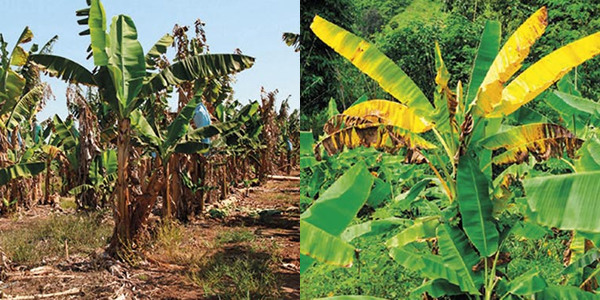This week AgroFair was startled by the news that a first case of the banana fungal disease Fusarium oxysporum spp cubense Tropical Race 4 (Foc TR4) has been identified in Peru. Fusarium is a large family of fungi that occur all over the world and affect many crops. Foc specialises in bananas and Foc TR4 is a mutant that is the first to be able to attack the Cavendish banana. The Cavendish banana is the dominant export banana introduced because of its resistance to earlier Foc variants.
FoC TR4 is already widely present in Asia and Africa, was first found in Colombia last year and has now been found in Peru. AgroFair sources large quantities of organic bananas from Peru. The cultivation of these bananas is not immediately at risk.

Measures
The affected plantation has now been completely isolated, and measures have been taken to protect other plantations against the introduction of the fungus. A package of phytosanitary measures, as specified in the TR4 supplement to the GlobalGAP standard, has been taken. The bananas themselves are not infected with the fungus. It only reaches the roots and stem of the banana from the soil.
Solutions
No curative treatment of plantations affected by TR4 is possible. Isolation and protection of healthy plantations is the only remedy. AgroFair has therefore already started training and informing producers a number of years ago. AgroFair also chairs the Task Force TR4 of the World Banana Forum. AgroFair has also urged the Peruvian authorities to take strong, collective measures throughout the cultivation area, and has offered help in further mapping possible contaminations.
Our local team in Peru is intensifying the training of farmers through an online training programme.
Several universities are working on resistant banana varieties. It is hoped that this will eventually provide a solution. However, there is a chance that the characteristics of such a resistant banana, such as shape and taste, will be different from what we are used to now.
Another possible solution would be to grow Cavendish bananas in a low-density set-up in combination with other plants and trees. In such an arrangement, the susceptibility of the plants seems to be lower. However, the cost price of such bananas will be substantially higher, much closer to the integral ecological and social costs (True Cost).
Perspective
We do not expect any change in the supply of Peruvian bananas in the coming months. We expect that the started policy to prevent the spread of the fungus in the production area will be successful. We are therefore counting on being able to buy high-quality organic bananas from Peru for many years to come.
In the meantime, we also have supplies of organic bananas from Ecuador, Colombia and the Dominican Republic.
For more information:
AgroFair Benelux
Tel: +31 (0)180 643900
Email: [email protected]
www.agrofair.nl
